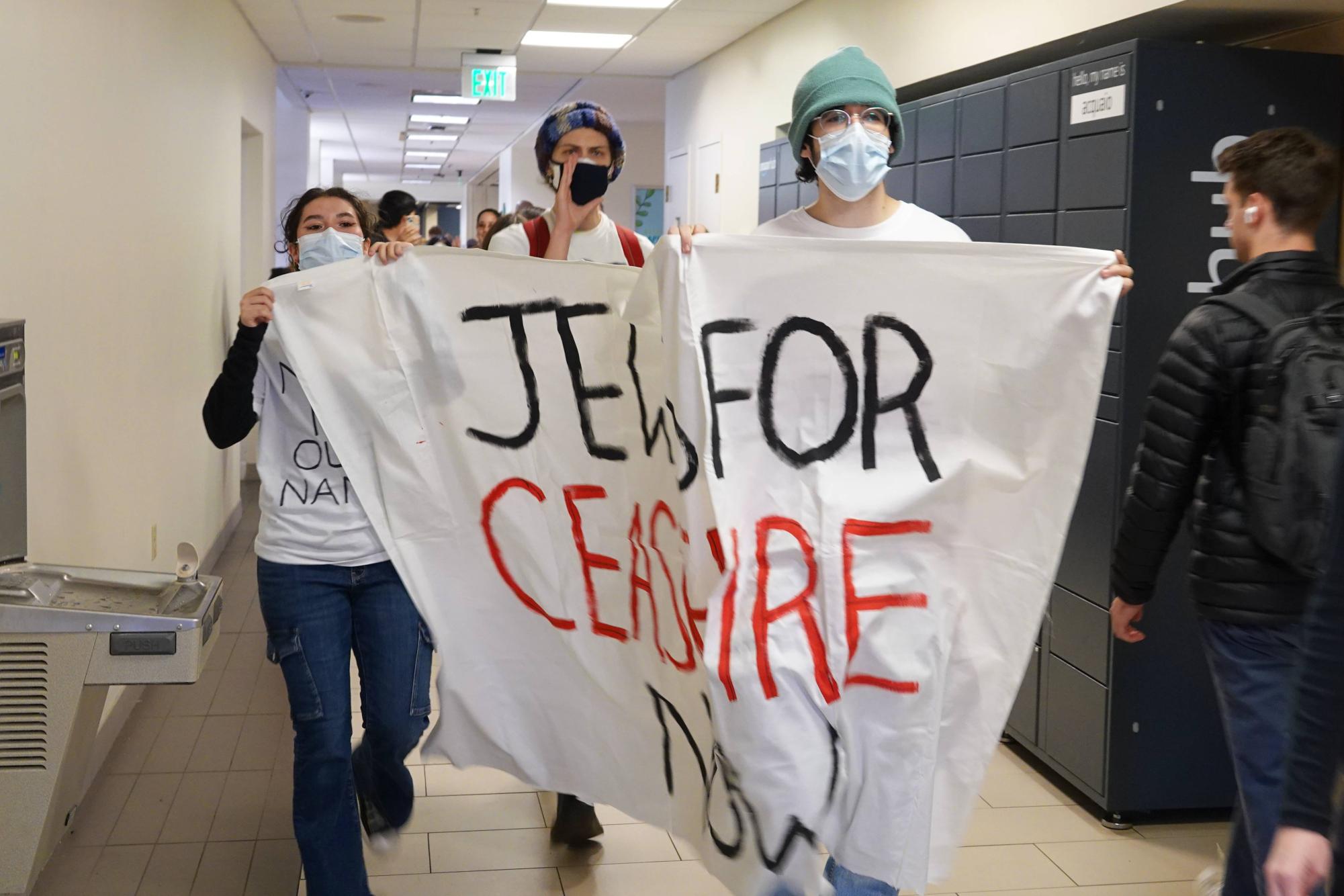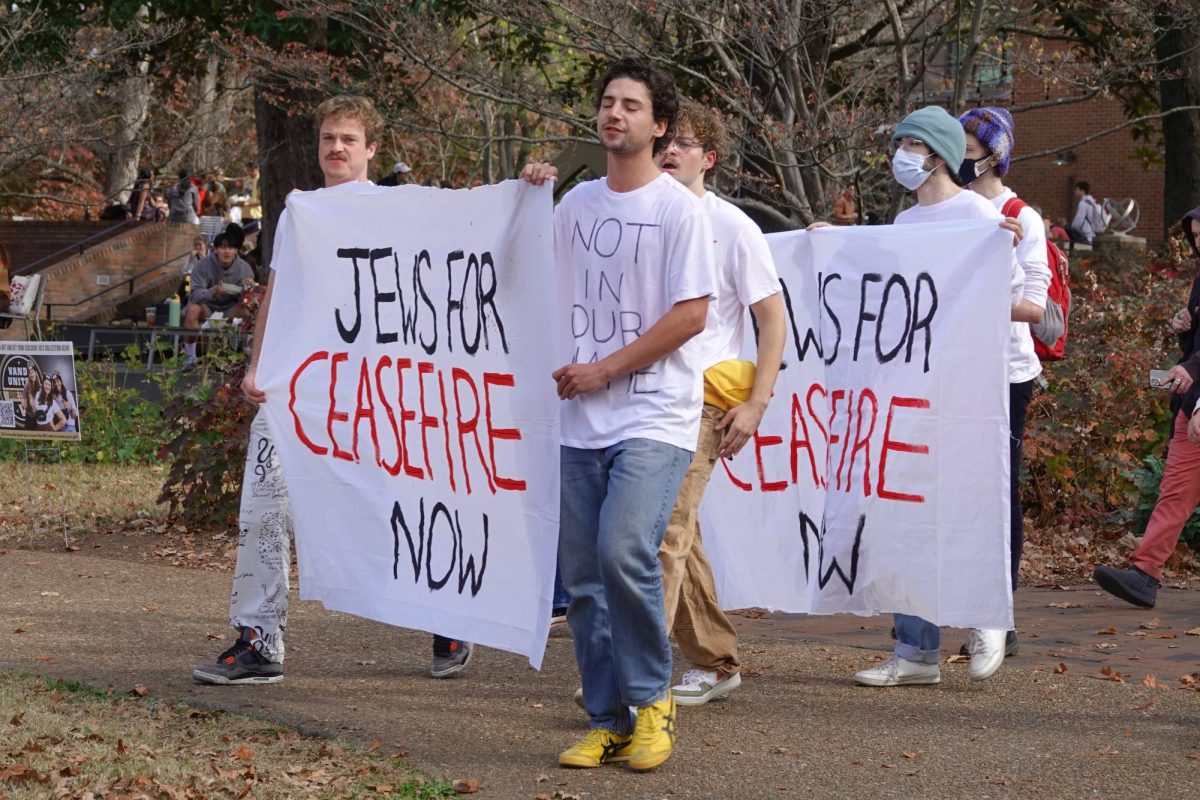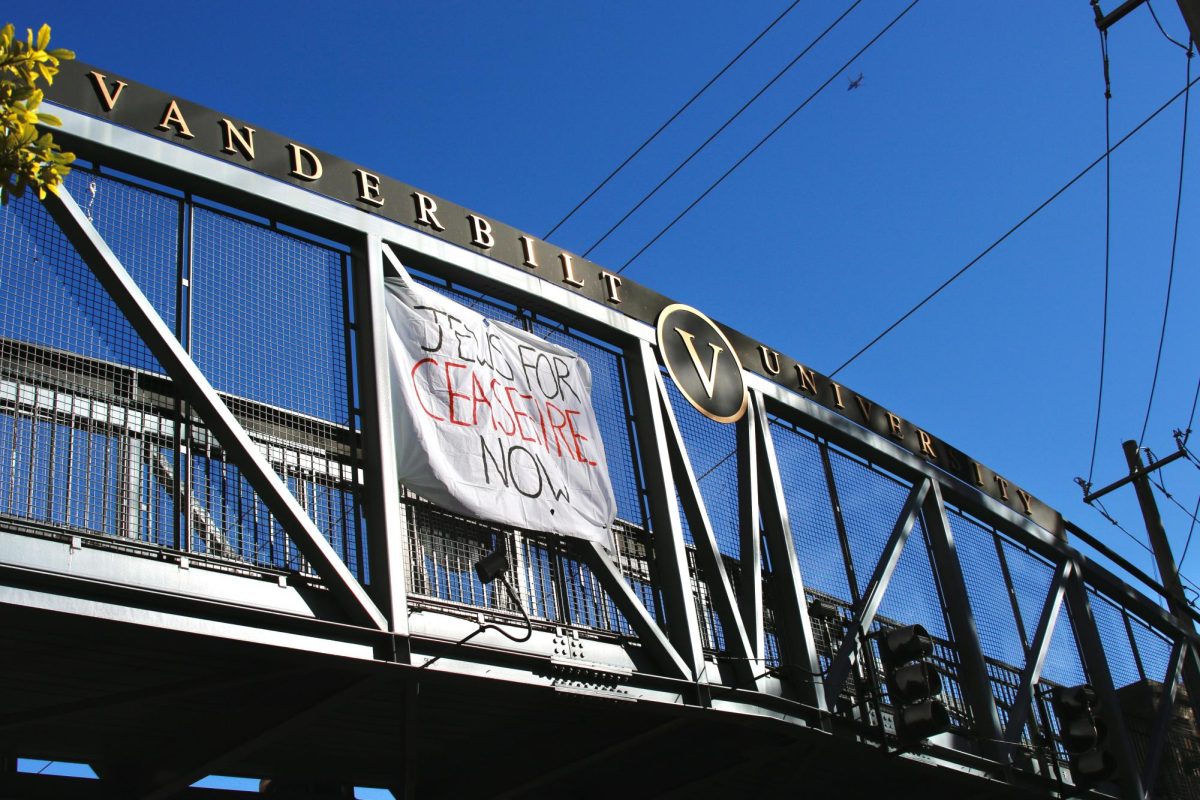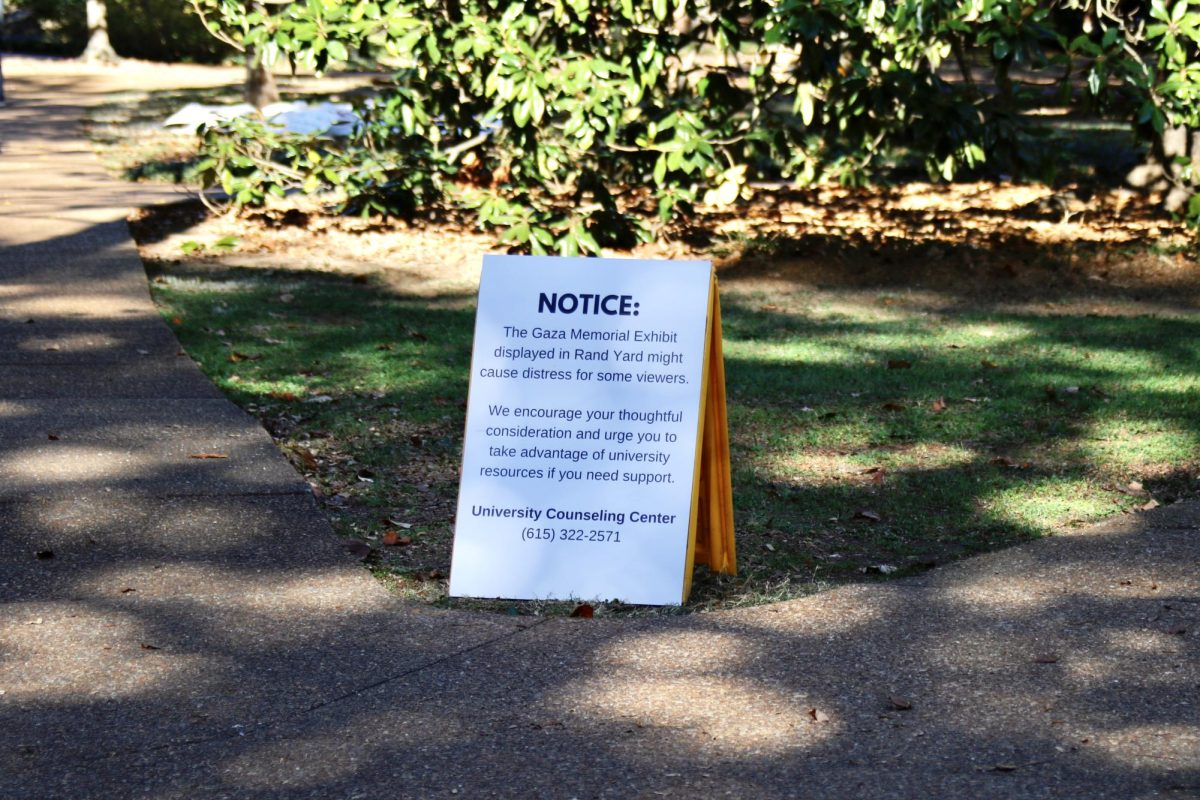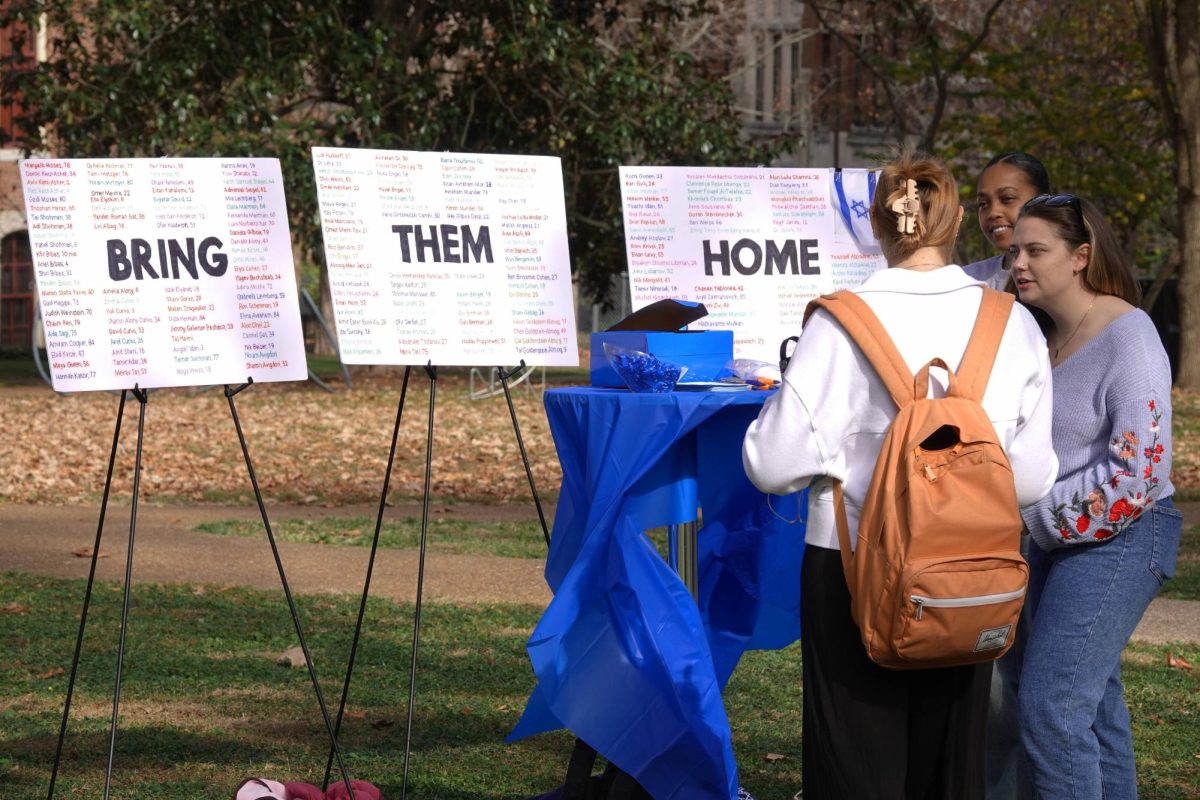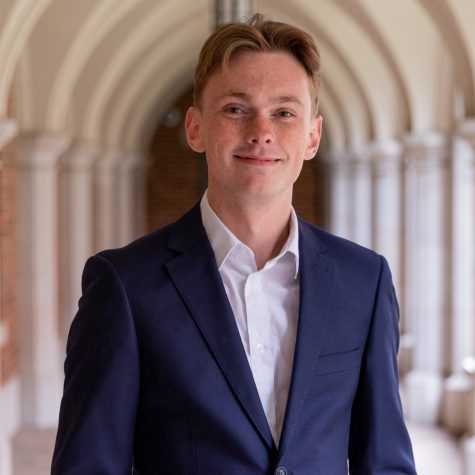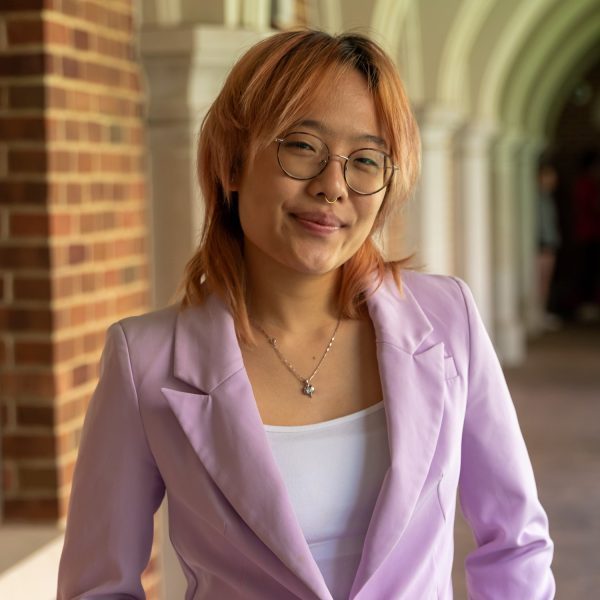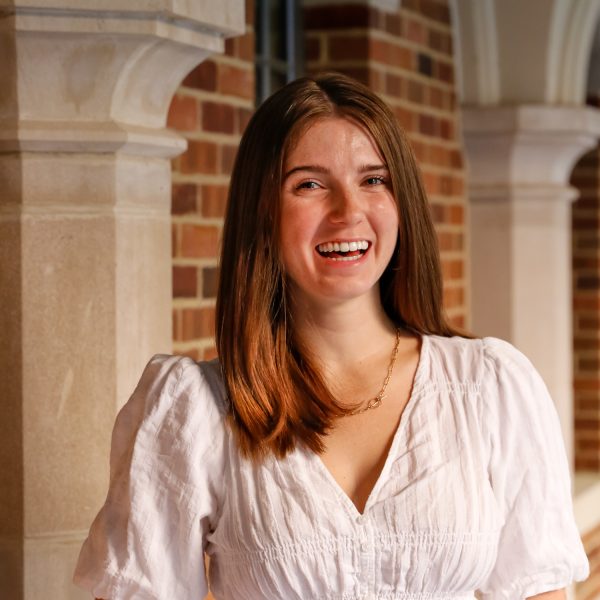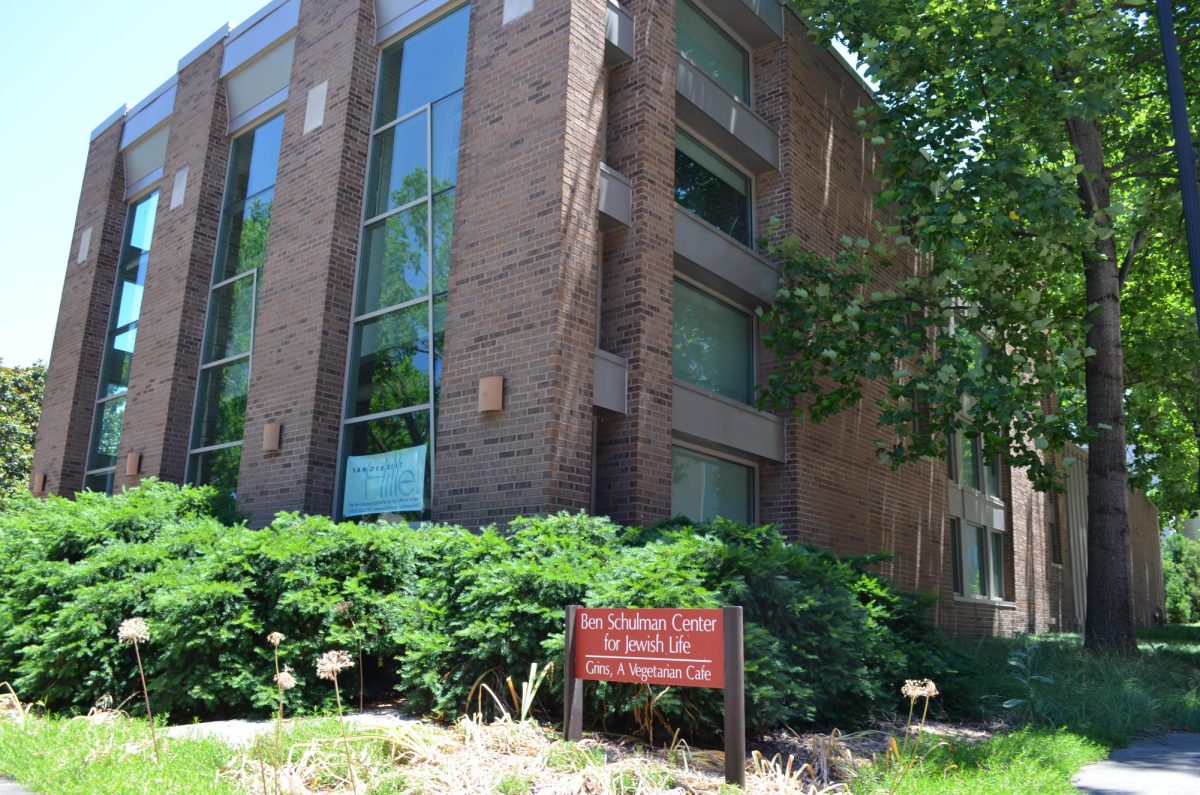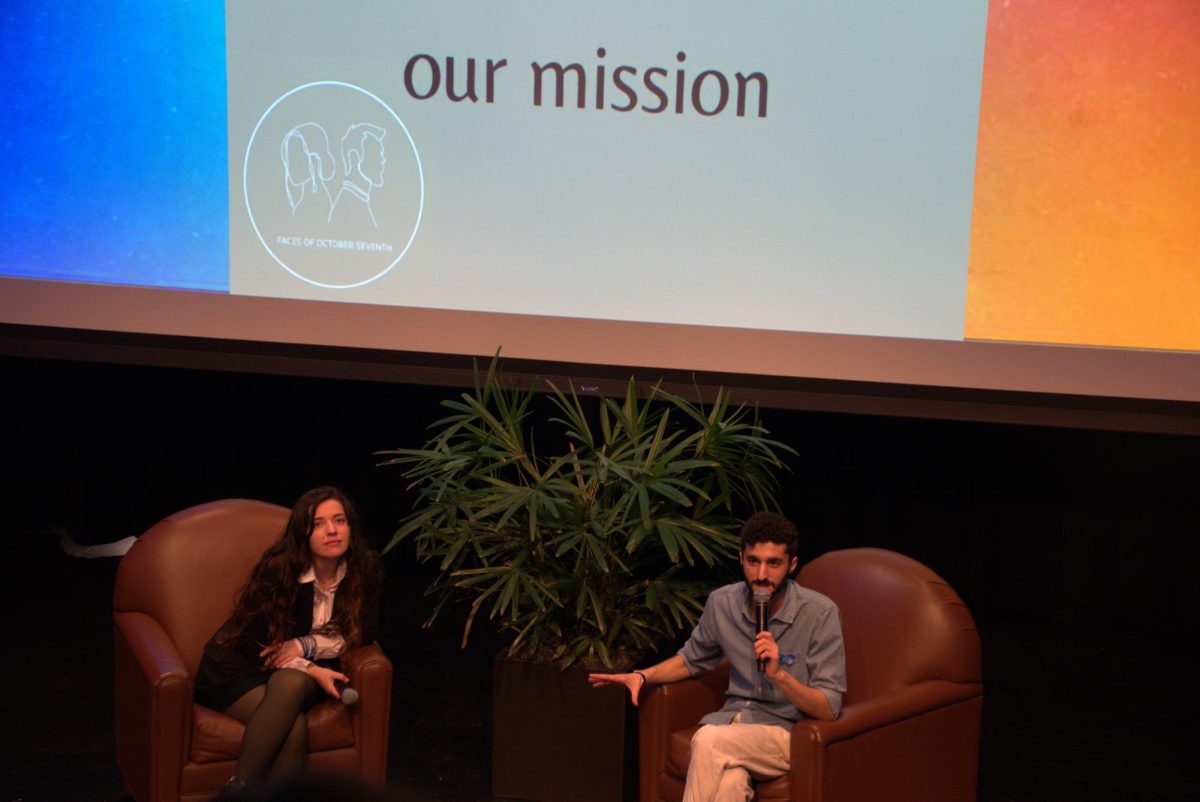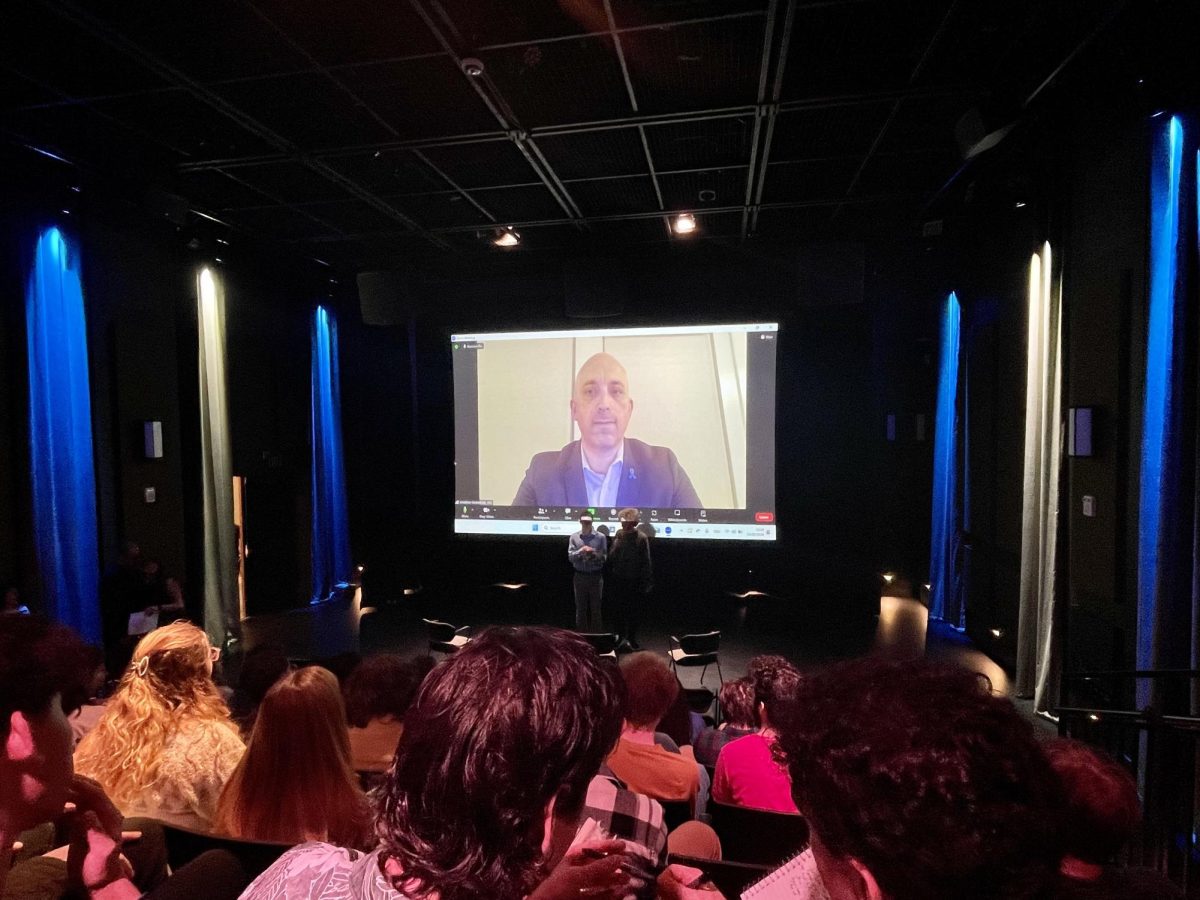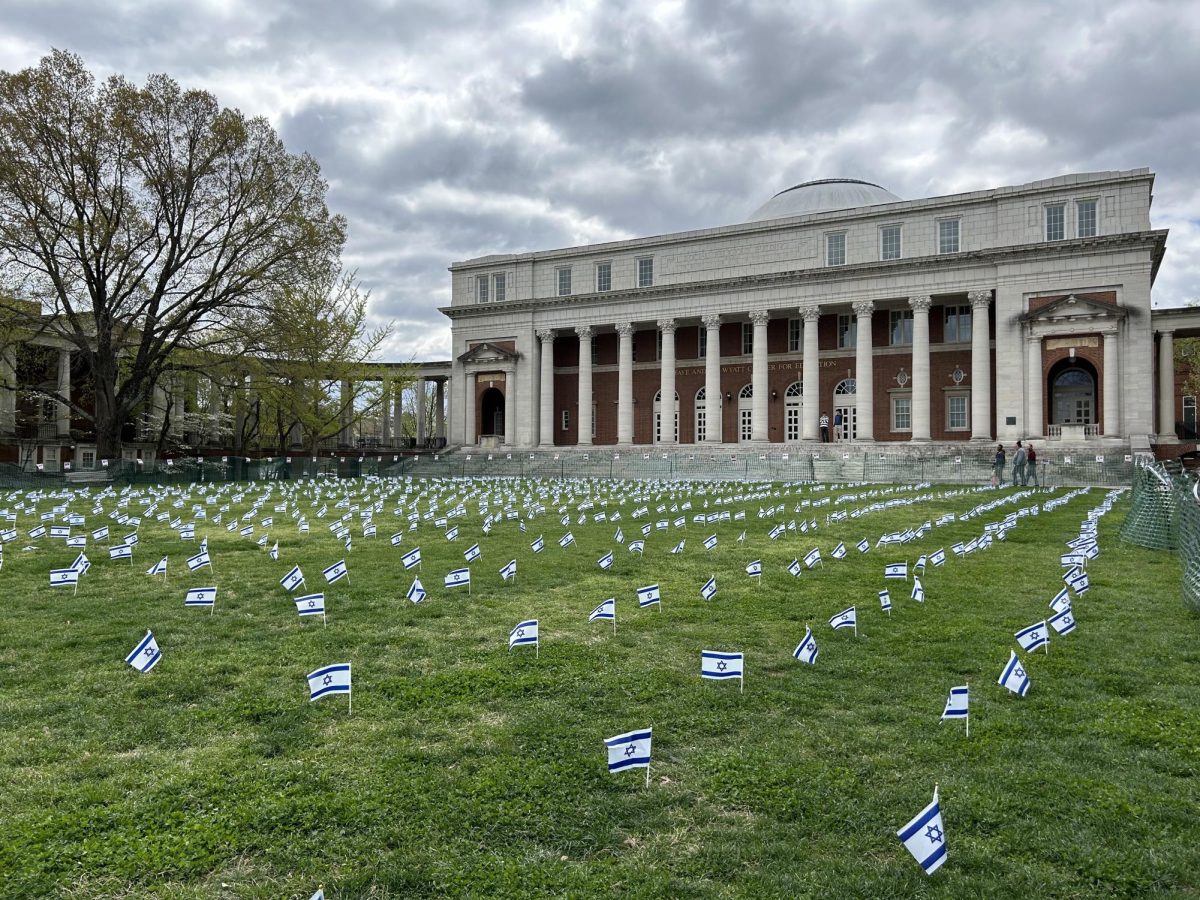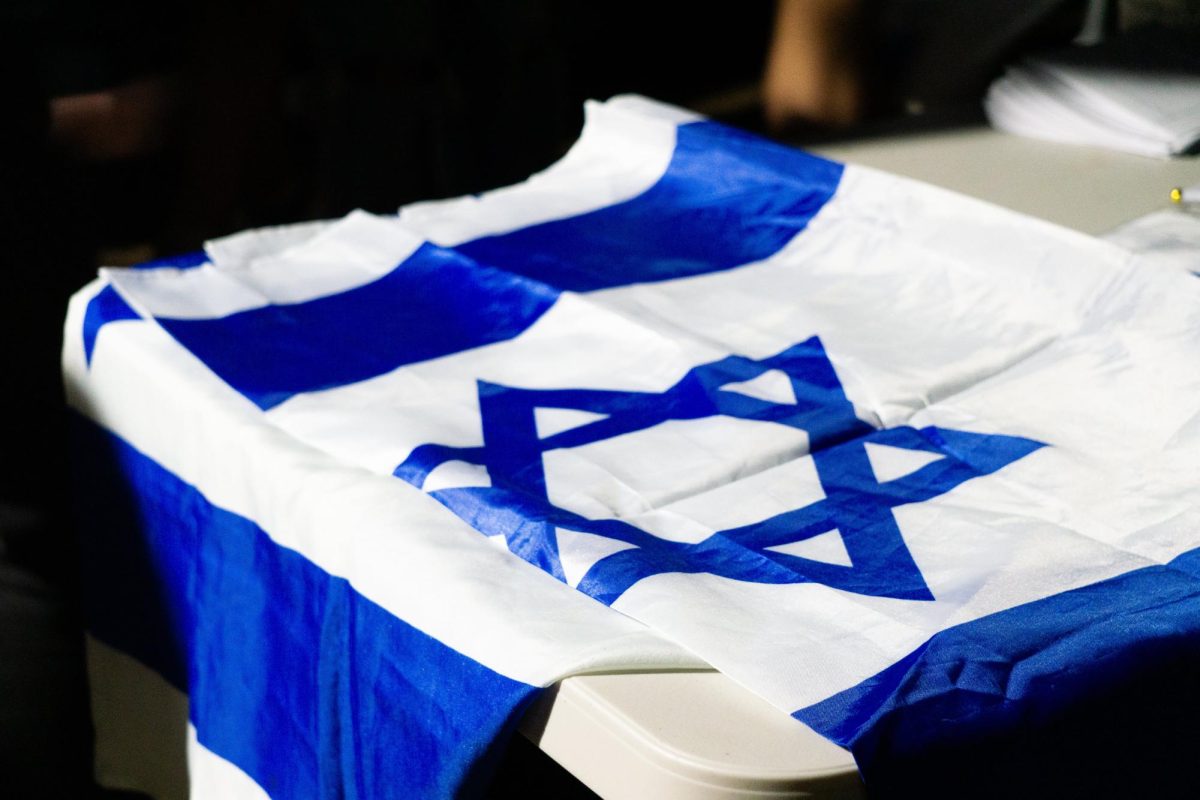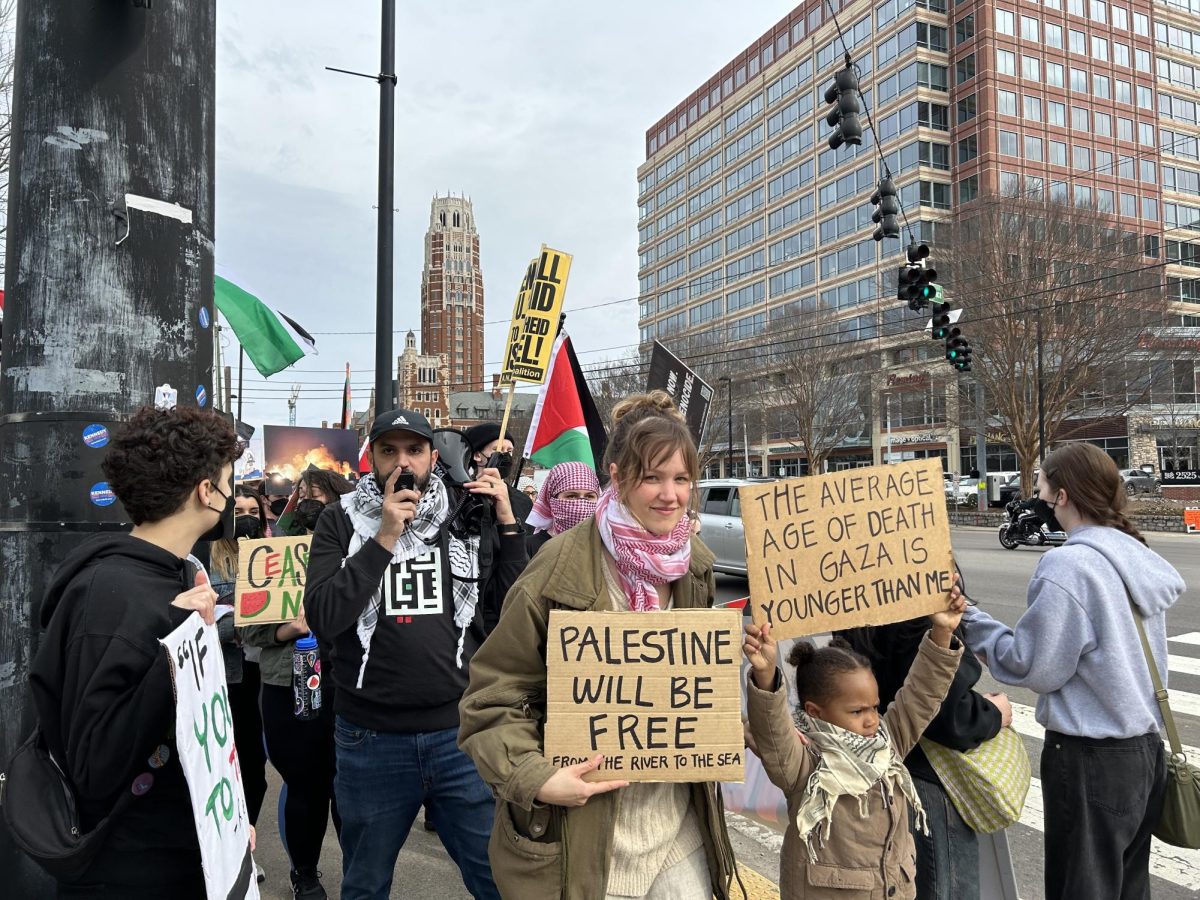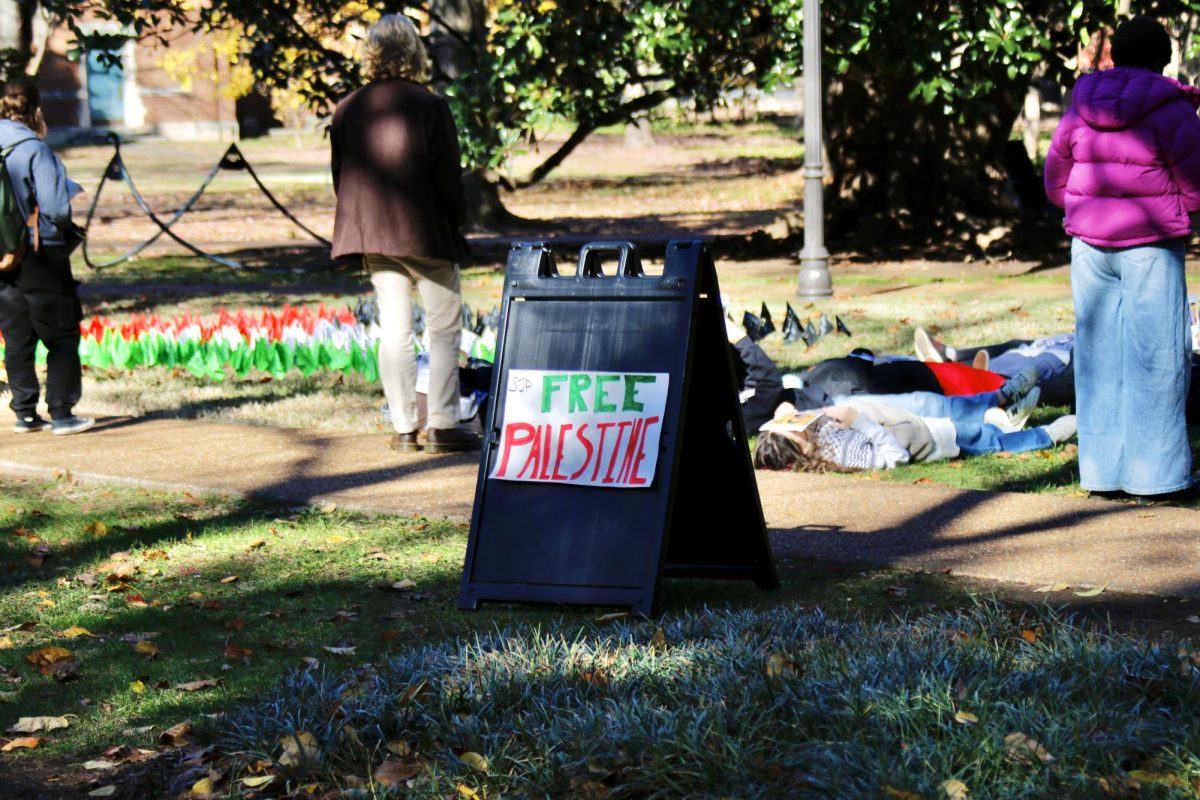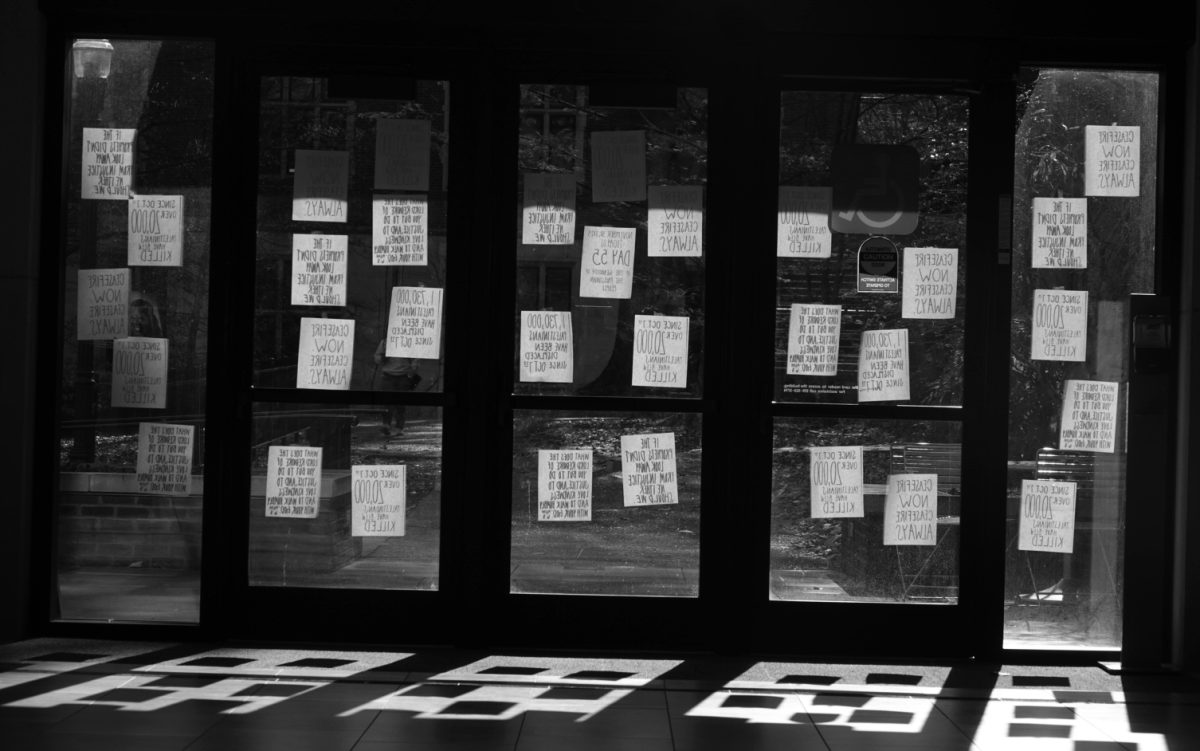Amid installations from Vanderbilt Students for Justice in Palestine and Vanderbilt Hillel concerning the conflict in the Middle East, a group of students identifying themselves as Vanderbilt Jews for Ceasefire staged a demonstration inside Rand Dining Center. The students, most wearing masks, chanted slogans in support of a ceasefire in Gaza, including “Stop the Siege,” “Let Gaza Live” and “Not In Our Name.”
The demonstration occurred at around 12:30 p.m. CDT on Nov. 15, while the exhibits occurred all day. VUPD stationed several officers on and around Rand Yard during the exhibits, including some in plain clothes. VUPD told The Hustler these measures were solely precautionary rather than in response to any known threat.
Dean of Students G.L. Black emailed the Vanderbilt community on Nov. 20 at around 11 a.m. CST acknowledging the exhibits and protest. The email states that several students “shared concerns” about the demonstrations, especially the unregistered protest. Black added that the Equal Opportunity and Access Office is following up with the protestors about Vanderbilt’s policies and reviewing reports of concern. He did not specify the nature of the reports and who they involve.
The email reminds students that “discrimination, harassment or threats of any kind” are not permitted at Vanderbilt.
“Our community has worked very hard to process and discuss the painful and often deeply personal issues related to the war in a civil and respectful manner,” the email reads. “As you speak up and speak out, I hope you will always be mindful of the effects your words and actions might have on your fellow community members.”
Jews for Ceasefire demonstration and signage
In addition to occupying the dining hall, the demonstrators distributed flyers listing their demands and providing an email address to contact them. The flyers included a QR code linking to an open letter to Chancellor Daniel Diermeier asking for Vanderbilt to lobby for a ceasefire, divest from entities that contribute to Israel’s finances and take a “vocal stance” against Israel’s “continued assault on Gaza.”
“That the violence against innocent civilians in Gaza is being perpetrated in our name is morally unacceptable,” the letter reads. “We do not believe that Palestinian freedom and Jewish safety are mutually exclusive.”
The letter also criticizes Vanderbilt’s position of principled neutrality.
“Vanderbilt’s stance of ‘principled neutrality’ is deeply immoral because there is no ethical neutrality in a genocide,” the letter reads. “Through our demonstration, we are sparking conversation, reaching students who have been afraid to speak out, and pressuring our institution to come out in unequivocal support for peace.”
Black’s email stated that the group was asked to leave and led out of Rand due to violating university policies preventing “activities that may disrupt university operations.” The student demonstrators calling for a ceasefire then walked from Rand to the Office of Undergraduate Admissions, where they handed a copy of their letter to a staff member and placed their banners in front of the building.
A student who organized the demonstration and is being kept anonymous for safety concerns and protection from retribution stated that the protest received a “range of responses” from students.
“For the complaints that we were disrupting people’s lunch: That was the point of our demonstration. People should not be able to sit in willful ignorance during a genocide,” the demonstrators said in a joint statement to The Hustler. “We plan to continue demonstrating in support of a ceasefire, peace and divestment until Vanderbilt administration has no choice but to act.”
According to the United Nations Convention on the Prevention and Punishment of the Crime of Genocide, genocide is defined as an act committed with the intent to destroy a national, ethnic, racial or religious group.
The U.N. Human Rights Council released a statement on Nov. 16 warning of a “genocide in the making” in Gaza, and various experts have suggested that Israel’s retaliation against Hamas and the Palestinian people constitutes genocide. Raz Segal, the program director of genocide studies at Stockton University, listed Israel’s mass destruction and cutting off of basic supplies as evidence.
Other experts disagree, stating instead that Israel has only expressed a desire to destroy Hamas, which does not encompass an entire religious, ethnic or racial group. Many scholars have also pointed to the high threshold required to meet the legal definition of genocide, which mandates that “proven intent” be shown.
David Simon, director of Yale University’s genocide studies program, told TIME that parts of both Hamas and the Israel Defense Forces could be found guilty of genocide but emphasized that this situation is “not textbook.”
A banner reading “Jews for Ceasefire Now” was also hung from the bridge between Stevenson Center and Magnolia Lawn, while another was draped over the base of the Harold Stirling Vanderbilt statue near Buttrick Hall.
Both banners were removed before 10:30 a.m. CDT. The Office of Student Affairs told The Hustler in an email that it does not know who posted the banners and that they were removed for violating university policies on posted signage. The response, which came from Black’s email address, was signed by “Student Affairs” and was not attributed to a specific person in the office. The student demonstrators with Vanderbilt Jews for Ceasefire also collectively stated they do not know who posted the banners.
Students for Justice in Palestine exhibit
On the morning of Nov. 15, SJP assembled an exhibit on Rand Yard memorializing the civilian lives lost in Gaza.
The exhibit consisted of a sculpture of several small body bags smeared with red paint to imitate blood. It was accompanied by several signs, some of which read “There is more spilled blood than drinkable water in Gaza,” “This is a genocide” and “Free Palestine.” Other signs offered statistics about the war, including the Palestinian Health Ministry’s death toll of over 11,200 Palestinians.
A representative of SJP, who was granted anonymity for safety concerns and for protection from retribution, told The Hustler that the exhibit aimed to bring attention to the growing civilian death toll in Gaza.
“People have been supportive. A good amount of people have come up to our members and have had peaceful conversations,” the SJP representative said. “Although not necessarily the focus of the memorial, this was definitely a positive reaction.”
The exhibit was also surrounded by notices from university officials that it might cause distress for some viewers. The notices encouraged students to “be thoughtful” and take advantage of university resources including the University Counseling Center.
First-year medical student Trisha Pahawa said she saw and appreciated the exhibit.
“I’m so proud of SJP for honoring the deaths of Palestinian victims,” Pahawa said. “The level of trauma and pain in Palestine and to Palestinians worldwide is honestly unimaginable, and even though no exhibit does that justice, what SJP did is very necessary for Vanderbilt students to directly recognize how to empathize with Palestinians to create and advocate for systemic changes immediately.”
The SJP representative described Vanderbilt’s regulations regarding on-campus demonstrations as “difficult to navigate” and said they worked extensively with the Student Center for Social Justice and Identity to register the exhibit properly. Black’s email to students stated that university policies about registering demonstrations intend to preserve the safety and civility of those involved.
“The process was a bit long,” the member said. “We were not informed about or involved in the warning signage or any of the text written on it.”
Senior Nathan Appelbaum, Vanderbilt Hillel president, said he was “disturbed” and “offended” by the SJP exhibit.
“Vanderbilt has been trying to maintain an atmosphere on campus that would allow students to feel safe while expressing themselves and challenging one another around these events,” Appelbaum said. “As I see it, [SJP’s] display was intended to evoke an intense emotional response from all those who see it. During a time when there is a lot of collective hurt and pain, these inflammatory events do nothing to promote real conversation and change but rather create a climate of hostility and separation.”
Vanderbilt Hillel sent an email during the evening of Nov. 14 notifying students about the SJP exhibit.
“We were recently made aware that there will be an installation on campus tomorrow that depicts elements of the war between Hamas and Israel. The installation…is by all accounts intended to be provocative and inflammatory,” the email reads. “If you are feeling upset, need support or a safe space, or are looking to speak with a Hillel staff member, we will be available at the Hillel building throughout the day — please stop by any time.”
The SJP member expressed concern with the way that Hillel described the SJP exhibit to students.
“There was absolutely no intention of being ‘provocative and inflammatory,’” the member said. “I’m confused as to how they came to a different conclusion.”
Hillel exhibit
Vanderbilt Hillel hosted an adjacent exhibit on Rand Yard beginning at 10 a.m. CDT on the same day as the SJP exhibit. The exhibit consisted of posters reading “Bring Them Home” and listing the names and ages of Israeli hostages currently held by Hamas. The exhibit was interactive, asking students to tie white ribbons to a large Star of David in a show of support. It also included blue ribbon pins for students to wear, as well as pens and paper for Jewish students to anonymously share their experiences on campus.
Junior Zander Schwartz, president of Dores for Israel, said the exhibit was organized as an outlet for Jewish students to grieve.
“We recognize the immense pain students have been experiencing over the past month and wanted to offer our community a space to comfortably grieve adjacent to the SJP display,” Schwartz said. “Our display was planned and showcased by students.”
Schwartz clarified that Hillel’s exhibit was organized in response to the SJP exhibit.
“We knew they were holding a display, so we wanted to plan something at the same time,” Schwartz said. “The intention was not to comment on SJP’s display but to offer a space for our community adjacent to theirs.”
Appelbaum said the interactive aspect of the Hillel exhibit was important to him.
“What we did outside of Rand today was just one way we plan to stand up and be counted,” Applebaum said. “The interactive component of our display was an opportunity for those who may have found it hard to make their impact and have their voice shared over the last month to finally be heard.”
Junior Sarah Fischer also said she appreciated the interactive elements of the exhibit.
“I am wearing a blue ribbon on my chest to show that I am a proud Jew, and I am not afraid to be Jewish on campus,” Fischer said. “It was very powerful to put that on my chest.”
The SJP member expressed frustration that Hillel was able to register and host an exhibit on an accelerated timeline. Student Affairs declined to comment on this situation.
“SJP has had several different protests and demonstrations, and no such exception has ever been granted to us,” the member said.



